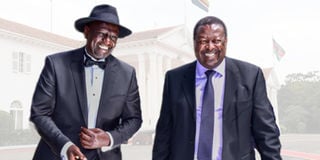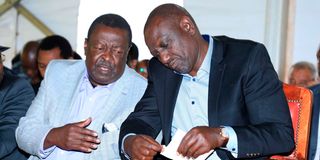Premium
Why President Ruto picked Musalia Mudavadi as his key economic diplomat

President William Ruto (left) with Prime Cabinet Secretary Musalia Mudavadi.
What you need to know:
- Mr Mudavadi says President Ruto's diplomatic efforts have so far yielded significant achievements and benefits for Kenya's economic development.
During his address at the revered Chatham House in London last week, Mr Mudavadi acknowledged that Kenya’s “forays in the sphere of economic diplomacy have yielded positive results.”
President William Ruto has tapped Prime Cabinet Secretary Musalia Mudavadi to drive the country's economic diplomacy agenda and seek partnerships with foreign nations to boost Kenya's economy.
Mr Mudavadi, whose portfolio was expanded by the Head of State in October when he was appointed Cabinet Secretary for Foreign and Diaspora Affairs, has stepped up his foreign missions to position the country "as a destination for Foreign Direct Investment (FDI) to boost exports and create job opportunities for Kenyans across the world".
In doing so, President Ruto is said to be keen to achieve the Kenya Kwanza manifesto of "leveraging our international engagements to create opportunities for our citizens, businesses and investors".
Mr Mudavadi is a former Minister for Finance and the longest-serving public servant in the cabinet having joined cabinet at 29 years. He had held key dockets in Government and participated in liberalising the economy.
He mended fences with key global actors including Bretton Woods institutions.
He says that President Ruto’s diplomatic efforts have so far yielded significant achievements and benefits for Kenya’s economic development.
“Our Administration is embarking upon a new age of diplomacy where friendships and relationships are interwoven with mutually beneficial economic engagements,” Mr Mudavadi says.
The visit by King Charles III and Queen Camilla to Kenya in October, Mr Mudavadi adds, “crowned a deluge of no less than 25 visiting world Heads of State and Governments in less than a year.”
“…not to mention those who attended the inaugural Africa Climate Summit in Nairobi in September. The visits point to the growing stature of Kenya as a dependable investment destination and more so, as an honest peace broker on the Eastern rim of Africa. Again, this is by design,” he adds.

President William Ruto (right) and Prime Cabinet Secretary Musalia Mudavadi.
During his address at the revered Chatham House in London last week, Mr Mudavadi acknowledged that Kenya’s “forays in the sphere of economic diplomacy have yielded positive results.”
“For example, in November, the Government of Kenya granted approval for the establishment of India Exim Bank's East Africa Representative Office in Nairobi, marking a significant stride in economic diplomacy. This decision comes on the heels of India Exim Bank's substantial financial backing for Kenya in diverse sectors, including energy, textile, apparel, agriculture, and support for small and medium-scale enterprises,” he said.
This move, he notes, not only reflects confidence in Kenya as a premier investment destination but also underscores Nairobi's pivotal role as a regional financial hub.
Significant contributons
“The role of the Kenyan diaspora cannot be overstated; they serve as our foremost ambassadors and hold a major stake as investors in our nation. The diaspora makes significant contributions to our economy, remitting billions of dollars annually,” he says.
Mr Mudavadi argues that the diaspora serves as cultural ambassadors, fostering understanding and cooperation between Kenya and their host countries.
“Likewise, our foreign policy aims to support and protect the diaspora, recognising their crucial role in our national development.”
The Kenyan diaspora, particularly in the United Kingdom, he adds, has been instrumental in bridging the gap between the two nations.
“In 2020, the diaspora in the UK remitted US$230 million (equivalent to 181 million Sterling Pounds). The inflows have increased tenfold in the last 15 years, reaching an all-time tidy sum of US$3.7 billion (equivalent to 3 billion Sterling Pounds) in 2021.”
“The transfers fuel the Kenyan economy, supporting families, funding education, and stimulating local businesses. However, it is worth repeating that the diaspora also fosters understanding and cooperation between the two nations,” added the PCS.
Political risk analyst Dismas Mokua argues that President Ruto has placed a premium on economic diplomacy as a strategy to position Kenya as the natural FDI (Foreign Direct Investment) destination besides growing and developing new markets for Kenyan goods.
“President Ruto’s invigorated economic diplomacy is the panacea to Kenya’s economic challenges. Given his experience, skills and qualifications, Musalia Mudavadi has the capacity and competence to offer the Ministry of Foreign and Diaspora Affairs leadership in promoting international trade and supporting Kenya firms to grow and develop new export markets,” Mr Mokua argues.
He says that the Ministry of Foreign and Diaspora Affairs has highly qualified foreign service officers with a solid understanding of global politics and economics who will position Kenya’s unique selling proposition across the world to trigger and accelerate FDI inflows and secure markets for Kenyan companies.
Economic diplomacy
“Globalisation of markets and production demands that States develop tools that will support their citizens and manufacturers develop products and services for the world,” adds Mr Mokua.
He says that Mr Mudavadi’s economic diplomacy agenda will assist Kenya Kwanza deliver on its manifesto by creating employment opportunities for Kenyans in Kenya and abroad besides supporting Kenya Kwanza wealth creation for Kenya.
In his past interview with Nation, Mr Mudavadi underscored the need to foster diplomatic engagements with other states “as we seek to build constructive and cooperative relationships on the global stage.”
“Rest assured that we will uphold our commitment to comply with international laws and treaties because we recognise that a rules-based international order fosters stability and prosperity.”
“In pursuit of our national interests, we have to navigate the complexities of the international arena as we work together with other nations in the spirit of cooperation, understanding and global humanity.”
At his Chatham House address last Week, the PCS reiterated that Kenya’s foreign policy imperative is to facilitate the country’s transformation into a competitive export-led economy, enhance regional integration and widen participation in both domestic and international trade.
“Under the guiding Bottom-Up Economic Transformation Agenda (BeTA), the payoff is beginning to show. Kenya's Trade Balance recorded a deficit of US$847.6 million in September 2023, compared with a deficit of US$1.0 billion in the previous month of August.”
“Kenya supports regional economic integration through the African Continental Free Trade Area (AfCFTA). At full implementation, AfCFTA will create the largest free trade area in the world. It will connect 1.3 billion people across 55 countries with a combined gross domestic product (GDP) valued at US$3.4 trillion; and the potential to lift 30 million people out of extreme poverty,” Mr Mudavadi said.
He noted that the country’s commitment to AfCFTA is embroidered in “a visa-free entry policy for all Africans.”
“It is in this spirit of continental unity that, His Excellency President William Ruto proposed a visa-free Africa, tearing down barriers imposed by hands that were not African,” he added.





